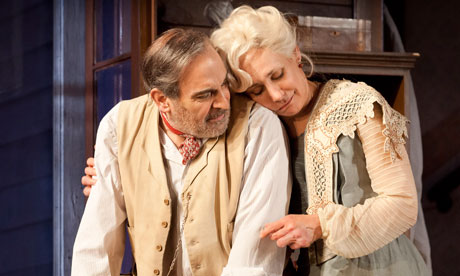
Eugene O'Neill's Long Day's Journey into Night is a mighty work. It has a straight-from-the-heart punch, a long, allusive reach and a deal of comic irony. Teetering on melodrama, it surges with operatic life, its speeches punctuated by a foghorn. O'Neill's wife said that watching him write the play, some 17 years before it was first staged in 1956, was to see a man "tortured by his own writing". And by his life. So much of O'Neill's own history is mapped out in this story of a family who clutch at each other to save themselves from drowning and end by going down together: the drunk and disappointed father, the morphine-addicted mother, the alcoholic son, the seafaring writer, the dead infant.
Anthony Page's majestic production ebbs and flows with O'Neill's play: a high-voltage first half, a fainter, more meandering last act, some Angela's Ashes passages, some thunderbolt moments. He brings out with particular skill something central: the importance of acting to this family; addicts are, after all, good at pretending. Quotation is always only a whisky glug away from the father – played with restraint and precision by David Suchet who gives a glimmer of what this man might have been as he delivers his Shakespeare. In a high-risk strategy the elder son (glaring, insolent Trevor White) outs the near-absurdity of a tragic moment: as his mother comes on – deranged and trailing her wedding gown – he caustically, sadly, compares her to Ophelia. The writer of the family, gleaming, tubercular Kyle Soller, quotes less and absorbs more.
Laurie Metcalf, riveting when she was the aggressive, long-faced cop sister in Roseanne, is the lodestar of this production as the woman slipping back into a morphine fog. She's on the slide from the beginning: her hands have an electric life of their own. She executes these twitches with more subtle disturbance than most actresses could manage – but it's a thing that other actresses might do. Her speech, though, is all her own: neither trance-like nor violent. She repunctuates each utterance, taking breath in unexpected, disconcerting places, all the while seeming never to draw breath. She is both loquacious and jerky: like an express train rushing over a bumpy track. She it is who, with an apt pause, points up O'Neill's final stroke of brilliance, making the play end not on a catastrophe but with a qualification. "I fell in love with James Tyrone and was so happy… for a time." In the midst of melodrama, lethal delicacy.
Stoke-on-Trent has been undergoing its own long day's journey. Mines gone, steelworks gone, shops boarded up; the Royal Doulton factory is rubble. It's a place whose image is being wiped out: it is nigh impossible to buy a postcard featuring Stoke.
The New Vic, a glorious in-the-round arena, has a long tradition of documentaries reflecting the life of the area. For the theatre's 50th anniversary, Alecky Blythe has added to it with her particular documentary style (actors repeat the real words of residents, played to them onstage through earpieces). Where Have I Been All My Life? is full of possibilities but it's a disappointment.
Over the past decade Blythe has made us listen freshly to the rhythm and vocabulary of everyday speech, and winkled out utterly new stories. Yet she looks at Stoke, and the hopes people have while being materially clobbered, through an all too familiar prism: for much of the time we could be almost anywhere.
The annual Stoke's Got Talent contest is re-enacted on a stage ringed with television monitors on which black-and-white footage of the Potteries and miners appears from time to time. The hopeful contestants are scattered among the audience. A lad and a dad on drums and guitar; a 14-year-old crooner; an elderly man with a mellow voice and a walking stick who finds it easier to go on stage after a couple of pints; a man who dedicates his act to a recently dead friend who was a weather forecaster in Prestatyn.
Audiences have been trained to look at talent-show contestants as exhibits, and that is how they appear here: dubiously gifted, hyper-bright cartoons. This despite flashes of revealing dialogue. One man is asked why he is "inclined to cultural things, when you've been what you've been". He was a mine worker. So: are "cultural things" best practised by the developers, financiers and politicians who have helped to undermine this city?
Everything is violently askew in Lee Mattinson's new play Chalet Lines, set in a Butlins chalet in Skegness. The lavs are dodgy, the Redcoats randy and, as in Belle and Sebastian's song "The Chalet Lines", there is forced sex and much woe. The floor is so steeply raked that the skimpy single beds almost topple off the stage; the walls are dotted with dozens of brightly coloured bulbs glaring down on dishevelment.
Equipped with Lurex, penis-shaped chocolates and desperate hilarity, the action hops from 2010 to 1996 to 1961 showing four generations of women whose inheritance is maternal bullying. As a woman squeezes her 16-year-old into a dress about as big as a finger bandage, anxious for her to get laid, she tells her she has legs like corned beef. The ferocity is extreme, pungently expressed and repeated: women's dependence on men's approval seems to be being blamed for their feral state, but the play doesn't so much develop as point to a pattern doomed, it seems (few escape), to be endlessly repeated. It's a sharp, punchy but not magnificent start to Madani Younis's reign as artistic director of the Bush.

